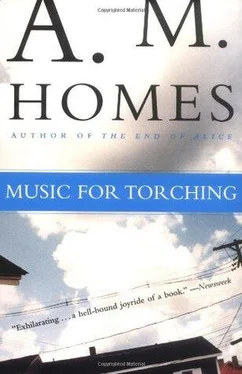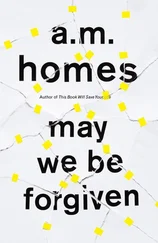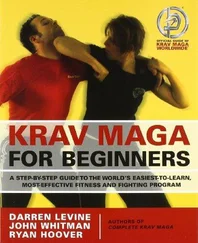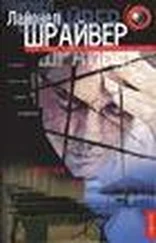Paul walked the corridors of his office looking for advice-"Do you own your house? Did you buy or build? Brick or wood? Flat roof or pitched? Any experience with stonework? What about fire insurance? Painters? Restoration? Reconstruction?"
"What happened? Couldn't wrestle your Weber?" one guy said, mocking him, as if to say, real men don't let their houses catch on fire.
"Things got out of control," Paul said.
"I bet," the guy said.
Three times he tried calling Elaine on the cellular and got a re- cording-"The cellular customer you're trying to reach is temporarily out of the calling area. Please try your call again later."
Paul thought of his friend Tom; Tom from college, Tom whom he hadn't seen in years. The other night in the motel room, Paul felt incredibly close to Tom. It was Tom he called, Tom who comforted him over the phone while Elaine watched.
Paul looked up the name of the company where Tom worked and gave him a call. "How are you?" Paul asked.
"How are you? is the question."
"I'm all right," Paul said. "Listen, I was just thinking about you. I wanted to thank you for the other night."
"Not necessary," Tom said. "So, where is it now? What happened with the police and the insurance investigator?"
"We're waiting to hear," Paul said, wishing they could talk about something else, about where they've been all these years, about their lives, their fears and failures.
"Any idea of what it's going to cost you?"
They talked in numbers, pluses and minuses. They talked without talking, without saying anything, all facts and figures.
"It'd be great to see you sometime," Paul said.
"Yeah," Tom said. "I'm a little bogged down, but when the fog lifts, definitely."
"We'll do it then," Paul said.
"If I can be of any help…"
"You've already been a help. Enormous. An enormous help."
"All right, then," Tom said.
Paul hung up feeling farther rather than closer. He hung up and immediately dialed Mrs. Apple. He dialed Mrs. Apple, desperate for a dose of connection. Things with Elaine were good this morning, which was nice, but he didn't want to push it; he couldn't expose himself, he couldn't ask her for comfort. He called Mrs. Apple and got her machine. He punched in the first bar of "Mary Had a Little Lamb"-their private code-and hung up.
Paul is on the train. Every day he rides back and forth with the same people. He knows what towns they live in, what kinds of coats they wear, what they eat for breakfast, but he has no idea who they are. They go in and out together and are entirely anonymous. Do they recognize him? Do they notice that some days he looks better than others? The train lurches, a woman he's seen every day for years comes down the aisle, he nods. She nods back. See, he tells himself, it's easy to make friends.
Paul sneezes. He reaches into his pocket for Kleenex, wondering what he's doing; he has never kept Kleenex in his pocket. But it's there, he uses it. This is not his jacket, it's George's. He goes through the other pockets; a ticket stub from a concert at the community center, an empty cellophane wrapper, pink pocket lint, and three-quarters of a roll of Life Savers-Wint-O-Green. He peels one off.
Paul walks home from the station. The sky is still bright with the cool static light of a sun neither ascending nor descending but seeming to fade slowly, withdrawing into the horizon. He walks, surprised by the number of thoughts he has, curious whether anyone has ever studied the speed of thoughts and why worrying runs faster than thinking. He pulls out his pocket calculator and tries to count the thoughts; every time he has one, he pushes plus one, and if he has the same thought again, he does it again exponentially.
Stop thinking, he tells himself, stay in the moment.
The air is nice, he tells himself. It is room temperature, neither too hot nor too cold, perfectly pleasant. As he walks, he's inclined to whistle-the refrain from Otis Redding's "Dock of the Bay." The world is his mirror. The mood is even. Nature is benevolent.
Ahead of him a squirrel is crossing the street, carrying a large nut in its mouth. It goes back and forth, unable to decide whether to make a dash for it or not. The squirrel goes forward; the treasure in its mouth slows it down. The station wagon doesn't see the squirrel; there is a small crunch. Paul looks at the car, he sees the driver, a woman, looking back in her rearview mirror. He watches the squirrel, its tail flapping, the last moments of its life a fast and frenetic attempt to escape what has already become inevitable.
Paul hurries the rest of the way home.
Mrs. Hansen sits at the picnic table in the backyard, staring into space.
Sammy is next to her. "Who do you think you are, mister?" He talks to himself and then waits for a reply. "Hey, hey, you, I'm talking to you."
"Evening," Paul says.
"Elaine's in the house," Mrs. Hansen tells him.
The house smells. The air is thick with an olfactory fog: fire, smoke, foul water, and her mother's perfume-all of it dipped in a thin film of Murphy's Oil Soap.
"Elaine," he calls.
"Upstairs," Elaine says.
Paul goes into the dining room. What's left of the curtains has cooled into a thick, fibrous blob. The hole in the side of the house is covered in heavy plastic. The walls are streaked, as though someone tried to wash them with a dirty sponge. Paul is seeing the damage thrown into the full relief of daylight-it's better and worse than he thought it would be. It is not global, the house does not need to be razed, but what's there is there-it's real. The room is a ruin.
The house is not something Paul can make a virtuous and manly show of Mr. Fix-it with. There's no reaching a hand in to turn a loose screw-saving them a handyman's house call and seventy-five bucks. The house isn't even like a radio he can pluck apart with the enthusiasm of learning how things work, sure he'll be able to put back every diode. Paul has never fixed anything. And he reminds himself that he did this, he brought it on; without a moment's pause to wonder whether or not it could be reconstructed, he destroyed it. Worse yet-and this is the part he's admitted to no one-he got a kick out of it. It felt invigorating, it felt fucking fantastic.
He goes upstairs.
Elaine is lying on the stripped bed.
"It looks better already," he says.
Elaine grunts. She doesn't mean to grunt. She means to say something, but the grunt is all that comes out. All day she's had things to say to Paul, things ranging from the incredibly warm and generous to the horrific: I adore you, you're the best, we can fix the house, we can make it better, you were so wonderful this morning. But then I remembered what an asshole you are and how you're screwing God knows how many women, and I hate you, I despise you. You're a disgusting, vile shit, and I want out. I just want out, whatever that means.
"I tried a hundred times to call you on the cellular," Paul says. "But you had it turned off."
"It was on, but we started getting strange calls-a woman
who wanted to know what I was wearing. At first I thought it was a survey, but then she kept calling, so I turned it off."
Paul blushes.
"Sorry. Our phone's fixed now anyway. My mother took care of it."
She points to the hole in the ceiling. "Do you think they saw it? Should we report it to someone?"
"We should take a picture," Paul says. "Where's the Polaroid?"
"In the dresser, bottom drawer, on your side."
Paul gets the camera, hangs it around his neck, and lies down on the bed next to Elaine. He aims the camera at the hole and shoots. A print spits out.
"Oh," Daniel says, coming into the room, finding both parents, fully dressed, lying on an unmade bed, staring at the ceiling.
Читать дальше












